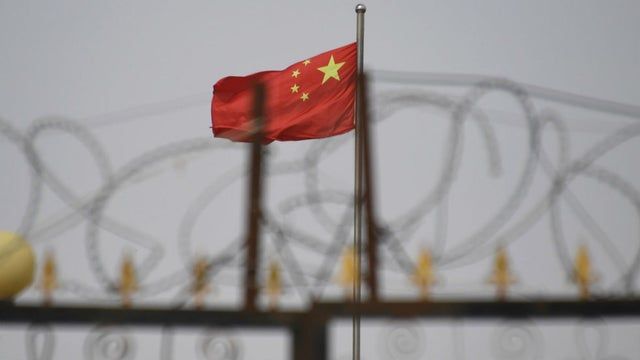The West can use economics to teach China a lesson about human rights
BY JIANLI YANG, OPINION CONTRIBUTOR
France is the first country to oppose the proposed Comprehensive Agreement on Investment deal (CAI) to be signed by the European Union and China, because of China’s treatment of Uighurs. While acknowledging that the proposed pact would be significant in rebalancing investment with China, Franck Riester, a French trade minister, said France has concerns that China has not fulfilled “sufficient commitments” to international treaties. The CAI received an “in-principle nod” in December, following seven years of negotiations, and was on the verge of being finalized in Brussels by the end of the year.

While there are doubts that the incoming U.S. administration under President-elect Biden will continue the Trump administration’s hard-line approach against China, France has taken the position that economic ties with China should not be at the cost of human rights of Uighurs in Xinjiang who face consistent persecution by the Chinese state. Even Jake Sullivan, Biden’s nominee for national security adviser, has asked Brussels not to proceed with the planned EU-China agreement without first consulting the United States. In a tweet, Sullivan noted that “early consultation with our European partners on our common concerns about China’s economic practices” is imperative.
France has pointed out that to support the CAI, there must be a clear commitment by China to sustainable environmental development based on the Paris Agreement on climate change. In addition, China has yet to ratify the International Labour Organization convention that prohibits forced labor. According to Riester, this is a “red line” for France. French opposition to the agreement with China rests on the persecution of Uighurs in myriad forms. We cannot facilitate investment in China if we do not commit to abolishing forced labor,” Riester told the newspaper LeMonde, adding that other countries such as Belgium, Luxembourg, the Netherlands and Germany share this position. “Trade agreements also serve as a lever to advance social issues, to fight against forced labor, in particular of Uighurs.”
Notably, the United Kingdom’s trade secretary, Liz Truss, has supported a role for the courts in her country to determine whether genocide is happening in Xinjiang with the Uighurs who are in China’s “re-education camps.” With a post-Brexit trade deal happening, the struggle over China within Boris Johnson’s government is understandable. Members of Parliament were debating an all-party amendment to the trade bill that would give the courts a preliminary role in determining whether genocide has been committed by a country with whom the U.K. might sign a trade deal. The U.K. Foreign Office has argued that the right to determine whether genocide is occurring in Xinjiang can take place only in an international court, not by a national government’s decree.
Several U.K. parliamentary committees are investigating allegations that China has breached international humanitarian law in Xinjiang. Consequently, U.K. fashion chains are clearing up their supply chains with China. Nigel Adams, minister of state for Asia, has told members of Parliament that he fears an “asset flight” could occur if the U.K/ imposes sanctions on Chinese officials for their role in detaining Uighurs in Xinjiang. Obviously, the U.K. realizes the risk to its economy if it moves toward individual sanctions against Chinese officials.
However, it is the United States, under the outgoing Trump administration, that continues to focus its attention wholeheartedly on the plight of Uighurs. Recently, Secretary of State Mike Pompeo ordered a review to determine whether China’s repression of Uighurs constitutes genocide. This raises the possibility that the U.S. may charge China with committing genocide before President Trump leaves office.
Similarly, the U.K. Foreign Office is due to present a new approach towards China that sets stricter obligations on firms trading in Xinjiang to ensure their supply chains do not involve slavery. According to the Center for Global Policy, China has forced thousands of ethnic laborers in Xinjiang to pick cotton by hand under a “poverty alleviation” scheme. In early December, the U.S. placed an import detention on cotton produced by the Xinjiang Production and Construction Corps, which produces 33 percent of Xinjiang's cotton.
U.S. lawmakers from both parties recently have called on Trump to act on human rights abuses in Xinjiang. Biden’s campaign used the term “genocide” to describe Beijing’s policies, laying down its marker on human rights issues in China. This sets the stage for a tense relationship between the two global powers once Biden takes office. However, the scope and intensity of Biden’s actions against China remain to be tested. Traditionally, the State Department has based such decisions on a rather narrow interpretation of genocide mentioned in the Genocide Convention. Previous deliberations have been cautious, such as the Obama administration’s refusal to designate Syrian President Bashar al-Assad’s government with committing genocide. There is no doubt that such a symbolic determination by the U.S. against China would carry diplomatic weight.
France has shown the way to countries seeking to counter China’s efforts to build economic links that promote its own failing economy. At the same time, pressure on China for its horrific persecution of Uighurs must become a consistent global phenomenon. For this purpose, it is necessary for the U.S. under Joe Biden to take the lead and lend its fullest support to the outcomes of Pompeo’s internal review and take it to its logical conclusion. That would be a fitting tribute to Trump’s determination to teach China a lesson.